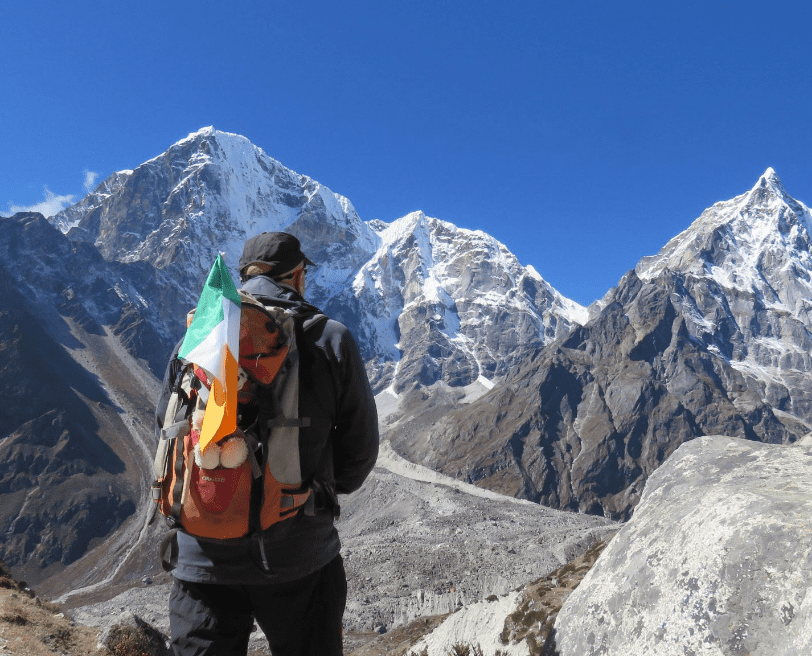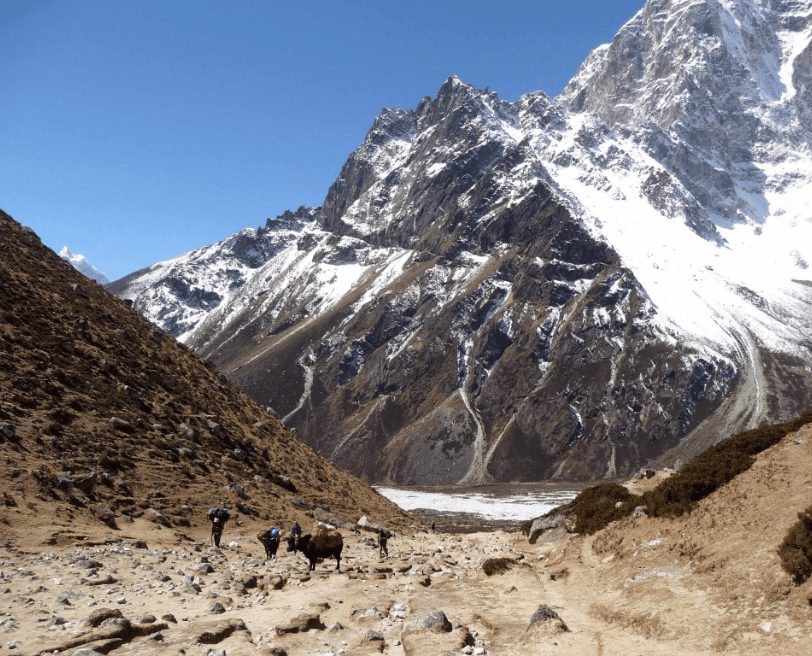
(Prepare For) The
Ultimate Everest Base
Camp Trekking
Experience
Lorem ipsum dolor sit amet, consectetur adipiscing elit. Ut elit tellus, luctus nec ullamcorper mattis, pulvinar dapibus leo.
Country
Tanzania
Duration
11-17 days
Grade
Moderate
Elevation
5,895m
Fitness Level
Good
Season
Year Round
Country
Tanzania
Duration
11-17 days
Grade
Moderate
Elevation
5,895m
Fitness Level
Good
Season
Year Round
Explore Everest's Majesty

Why Travel to Kilimanjaro With Pat Falvey
Altitude Experts:
Passionate Experts
Global Family
What's included?
Land-only €3,750

Included:
- Return internal flights between Kathmandu and Lukla
- All accommodation is based on twin/treble sharing of rooms and tents (if you require single accommodation, please let us know and we will advise of additional cost)
- Everest National Park entry fees
- All guide, porter and cook fees
- All meals and fully serviced trek
Not Included:
- Travel Insurance
- Meals en route before and after the final destination
- Bar bills, tips and laundry
- Personal gear
- Medication
- Insurance liability and hospital costs
- Our trips are designed to avoid any extra cost to the client. If you choose to leave the trip early, there will be additional expenses.
Optional extras

Ready to Make your
Everest Dream a
Reality?
Dates 2024
- 23rd of March – 9th of April
- 29th of September – 15th of October
Show Interest
What our customers say
A Once-in-a-Lifetime Adventure to Everest Base Camp
Additional Information
Everest FAQs
Additional Information
More FAQs
Day 1: Depart Ireland. Fly from Dublin Airport to Kathmandu.
Day 2: Arrive in Kathmandu. Overnight in city centre hotel. Depending on the time of arrival at the airport, day 3 may become a free day in Kathmandu.
Day 3: Fly Kathmandu – Lukla (2,860m). Trek to Phakding (2,610m). Overnight in Phakding.
Day 4: Trek from Phakding to Namche Bazaar (3,440m). Overnight in Namche Bazaar.
Day 5: Rest day. Rest day with acclimatisation trek to 3,800m.Time to chill out and explore the village. Overnight in Namche Bazaar.
Day 6: Trek from Namche Bazaar to Dingboche (4,410m). Overnight in Dingboche.
Day 7: Trek from Dingboche to Pheriche (4,371m). Overnight in Pheriche.
Day 8: Rest day. Rest day in Pheriche with acclimatisation trek to 4,500m.
Day 9: Trek from Pheriche to Lobuche (4,940m). Overnight in Lobuche.
Day 10: Trek from Lobuche to Gorakshep (5,164m). Overnight in Gorakshep.
Day 11: Trek from Gorakshep to Everest Base Camp (5,364m). Return to Lobuche (4,940m). Overnight in Lobuche.
Day 12: Trek from Lobuche to Dingboche (4,410m). Overnight in Dingboche.
Day 13: Trek from Dingboche to Monjo (2,835m). Overnight in Monjo.
Day 14: Trek from Monjo to Lukla. Overnight in Lukla.
Day 15: Fly Lukla – Kathmandu. Free day to relax and explore Kathmandu.
Day 16: Free day. Day to explore Kathmandu and the surrounding area. This day may also be used as a bad weather day in the case that flights from Lukla are delayed
Day 17: Depart Nepal and fly to Dublin
Day 18: Arrive in Ireland
Note: This itinerary is for adventure travel and is subject to travel
Our Everest Base Camp trek is suitable for all ages as long as you have a good general fitness level. Much of the trekking is moderate, but certain parts can be described as strenuous. Most days include between four and six hours of trekking, with the exception of acclimatising days.
We recommend that you attend our free Meet Weekend in County Kerry to say hello to the group and meet with our guides. This is an ideal opportunity to check out your fitness levels when you are assessed by our experienced guides on this preparatory hill walk. The day also provides a good opportunity to get any questions answered or concerns you may have concerning the trip. We talk about dealing with altitude and different weather conditions and giving tips on gear and general training.
We consider ourselves among the world’s leading experts in high-altitude trekking and pride ourselves on putting together trips that provide the best possible opportunity to succeed. Acclimatisation is key to success and it’s important that you don’t underestimate the time you allow yourself to adjust to your new environment. Pace is key to preventing AMS (Acute Mountain Sickness), and our guides monitor the group at all times for signs and symptoms.
On the Saturday of our Meet Weekend, we climb one of Ireland’s highest peaks during the day while, very early on Sunday morning, we undertake a night hike. The hike simulates the requirements on the summit day/night of the actual trek, taking you out of your comfort zone and helping you learn how to prepare your mind and body for the challenge ahead.
For beginners, we offer fitness testing weekends and a variety of hillwalking options (see our Courses &Training section) and recommend a 12-month personal training programme for Everest Base Camp. If you have some degree of fitness and experience, we recommend a six-month training programme to ensure that you can trek comfortably between 4,000m and 6,000m. Our suggested programme is as follows:
- Months 1-2: These should include fortnightly hillwalking treks lasting three hours and including carrying a small/medium pack weighing approximately 5kg.
- Months 3-4: Increase your fortnightly treks to last six hours plus and increase your pack weight to 7kg approx.
- Month 5: Do two walks on consecutive days twice during the month. Do a five-hour walk the first day and a six-hour trek on the second day. Be careful to avoid injury.
- Month 6: Continue with some hillwalking but reduce to lower peaks and durations of a maximum of four hours.
Ask your GP for advice on vaccinations, keeping in mind your travel history to date.
Clothing
- Lightweight long thermal underwear – tops and bottoms
- Short and long-sleeved t-shirts
- Expedition-weight long underwear – tops and bottoms
- Fleece jacket – mid-weight to heavy-weight; wind stopper an advantage
- Fleece trousers
- Parka jacket – down or synthetic parka with hood
- Jacket – waterproof and breathable
- Over-trousers, waterproof and breathable
Headwear
- Sun hat with good visor and white bandana or buff for protecting your neck
- Balaclava/facemask – 1, lightweight
- Wool or pile ski hat
- Head torch (inc. spare bulbs & spare batteries); suggested: Petzl LED
- Sunglasses – UV & IR protection
Handwear
- Liner gloves
- Synthetic gloves – lightweight, pile or polypropylene
- Waterproof mittens – 1 pair (optional)
Footwear
- Light hiking boots or trekking shoes
- Sandals or runners for tea house
- Socks – lightweight (2-3 pairs), sock liners, warm trekking socks (2-3 pairs)
- Foot powder
- Sleeping bag – -15 ºC comfort rating
- Water bottles – 1 or 2 x 1-litre wide-mouth water bottle, Nalgene
- Pee bottle – 1 x litre-wide mouth water bottle (optional)
- Pee funnel – for women (optional)
- Sunscreen – SPF 30-40
- Lipscreen – SPF 20-40, at least 2 sticks
- Sunblock
- Personal First Aid kit
Travelling
- Large duffel bag 100 litre
- Smaller duffel with a lock to store excess gear in the hotel
- Plastic bags to line stuff sacks to keep gear dry or a dry bag
- Travel clothes
- Travel towel
- Toiletry bag
- Camera gear
Miscellaneous items
- Travel insurance certificate
- Passport, visa and copies of all travel and insurance documents
- Money in Euro or US Dollars
- Earplugs and nail clippers
- Spare boot laces, bulbs, batteries, memory cards, etc
- Cold water detergent and some toiletries
- Small sewing kit
- A penknife and small scissors
- Diary or notebook and book for downtime
- Camera
- Insect repellent
- Toilet paper – it is good practice to bring your own, but it is provided to anyone if needed
- Baby wipes/hand wipes
- Hand gel
- Water purification tablets
- Personal medication
Ready To Challenge Yourself?
Dates 2024
- 23rd of March – 9th of April
- 29th of September – 15th of October

